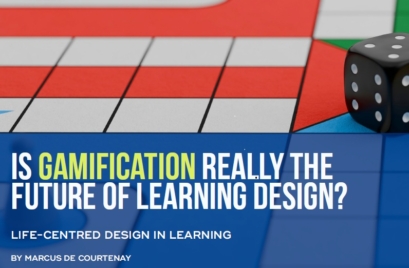
“More than ever before, knowledge sharing is being led by people, culture and context.” Jody Turner, Future Trends.
According to a study conducted of Fortune 500 companies in the early 2000s, the estimated annual cost of knowledge loss is around 31.5 billion USD. We can only imagine what that number is now. Considering the attention and money already poured into knowledge management systems and knowledge transfer processes such as onboarding and offboarding, that’s a significant challenge to overcome.
And an opportunity to be had.
In addition to what we know about the flow of knowledge within organisations, are the changing characteristics of how individuals receive, retain, and impart information. As the digital wave exponentially expands, Gen Z and Alpha are experiencing, what futurist Jody Turner calls, “a language sea change.” Those currently under-the-age of 20 don’t respond to lengthy written documents and minutiae but learn quickly and energetically in a way she describes as “healthy hacking.” They know how to short cut and aren’t afraid to “flex tech.”
So how can future-thinking leaders begin to adapt to the learning trends of their younger team members and ensure that the gaps in organisational knowledge sharing are shrinking rather than widening?
The Different Kinds of Knowledge
First, it’s important to understand how knowledge operates, so that we can set up the right context for sharing it.
Tacit knowledge (TK) encompasses the knowledge that we find difficult to explain and is usually gained from personal experience. Tacit knowledge in the workplace is what we often lose when a long-term team member leaves without some form of knowledge offload. It’s about the unspoken, the infrequent, the nuanced, and the short cuts that we learn cognitively. It is built upon context and familiarity.
Explicit knowledge (EK) on the other hand is easy to record and hand over. It refers to sets of instructions or any information that is objective, logical, technical and codifiable. EK can usually be clearly documented.
Unsurprisingly, sharing tacit knowledge presents the biggest challenge for organisations.
What is Knowledge Sharing?
Knowledge sharing has been defined as the “exchange, transfer and dissemination of knowledge between and among individuals, teams, departments and organizations.” This can include identifying problems and their potential solutions. Knowledge sharing is typified by certain kinds of behaviours: listening and asking questions, sharing ideas, and problem solving.
Knowledge management systems and transfer processes are ways of formalising the flow of this sharing and can shine a light on any knowledge hoarding or withholding. Historically, knowledge hoarding has been a behaviour that is underpinned by the belief that “knowledge is power”, and that limiting who has access to it will in some way increase that power. It fits with dated and reductive mechanistic thinking and siloed practices that operate through the scarcity lens of old power paradigms.
Associated, but not the same, is the rather more unintentional issue of dark data. Dark data refers to the unused, unknown, and untapped data generated by an organisation’s user interactions. It can be a vastly wasted resource that falls outside the vision of the big data managers.
Knowledge Sharing Spaces
So how do we harness our understanding of knowledge and knowledge transfer to build a richer, more efficient knowledge sharing culture? To begin with, organisations could benefit from becoming more intentional about their knowledge sharing spaces. We know, for example, that ‘tacit’ knowledge transfer benefits from several spatial approaches:
- Physically shared spaces – proximity and visibility provide a sense of belonging and facilitates the “stickiness” of tacit knowledge. We know this implicitly and empirically about human communication, so where possible, we should optimise it.
- Technically shared spaces – because virtual meeting and groupings (Zoom, Skype, Teams) or conference spaces (Gather, etc.) can bring geographically separate colleagues together, it contributes to the potential volume of explicit and tacit knowledge sharing. If curated thoughtfully, these spaces will remain an important factor in a knowledge sharing culture.
- Cognitively shared spaces – these spaces exist when we share language and common understandings. They are non-hierarchical, dynamic, and innovative, and are “critical for converting tacit knowledge into explicit knowledge.”
Knowledge Sharing in the Future
The anatomy of knowledge sharing is destined to reshape in the future in response to the evolving way people learn. We can already see shifts in this over the last decades. According to futurists, recent generations exhibit these differences:
- Baby Boomers – are verbal and like to be told how to do things
- Gen X – are visual learners who prefer the idea of “niche” everything
- Gen Y – are capable of toggling between visual and verbal. They want everything to be democratised, collaborative and experiential
- Gen Z and Alpha – are the “natural healthy hackers” who simply want to “do.” They learn through the use of symbols and haptic (physical) experiences. Hashtags are instinctively their language
As leaders of younger teams, how we package (our language and symbols) and present (which modality we use) knowledge will impact the success of how that knowledge is shared, retained, and actioned. By developing an understanding of how this might need to vary depending on the age and background of our team members, we can proactively support the process.
This may also include the possibility of incentivising knowledge sharing. Importantly though, research suggests that incentivisation is only successful if the team members receiving the knowledge help determine the reward. If the reward is decided by a leader separate to those involved in the transfer dynamic, the incentive does not appear to carry. This suggests that trust is central to the transfer exchange. So, “giving employees a say in who gets rewarded, and how, is key to incentivizing the sharing of knowledge.”
The Future of Knowledge Sharing
By becoming curious about knowledge sharing, we can become more strategic. Start by asking:
- Who should be involved in the knowledge transformation process?
- How do we best present that knowledge for optimal learning/exchange?
- How could we incentivise it?
- How do we encourage knowledge management participation?
And for leaders looking to farther horizons, consider the impending data storage crisis. Science is currently looking for storage alternatives that are ethical and sustainable such as DNA data storage. What implications would such a radical information storage option have on how we extract and exchange knowledge?
Our ways of knowledge transfer are set to revolutionise, and this can’t help but impact not only how we share it, but also how we apply wisdom to what we know, and operationalise all this knowledge?
Need More Help?
Keen to find out more about how to revolutionise your approach to knowledge sharing? Performance Frontiers help guide leaders and organisations look more deeply at the mechanisms and motivations, culture, diversity, and balances required to optimally scale excellence during periods of growth . Speak to Nikki today about how we can partner with you to steward your organisation into a greater, more abundant future.
While every effort has been made to provide valuable, useful information in this publication, this organisation and any related suppliers or associated companies accept no responsibility or any form of liability from reliance upon or use of its contents. Any suggestions should be considered carefully within your own particular circumstances, as they are intended as general information only.







